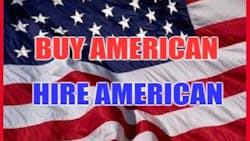Trump Seeks Headway on 'Buy American, Hire American' Pledge
Donald Trump on April 18 moved to make good on one of his emblematic pledges -- "Buy American, Hire American" -- by issuing a decree on tightening skilled-worker visa rules, but his room for maneuver remains limited without wider congressional reform.
During a trip to Kenosha, Wisconsin, Trump will sign a decree that singles out "abuses" of the H-1B visas that are pervasive in the U.S. high-tech sector, as a first step towards reforming the visa regime.
These time-limited work permits intended for scientists, engineers and computer programmers have become an important gateway for the many Indians drawn to Silicon Valley.
The United States issues 85,000 of the permits each year.
Like many of Trump's executive orders to date, the newest decree will have little practical impact, but sends a signal for the various government departments to come forward with ideas for reform.
It namely instructs the Labor, Justice and Homeland Security departments to tackle abuses of the H-1B system and draw up reforms aimed at bringing the program back to its original intent: awarding visas to the most skilled and highly-paid applicants.
"For too long, rather than operating as designed and allowing only the best and brightest to come in and fill key positions, the H-1B nonimmigrant visa program has been administered in a way that harms American workers," a White House official said.
Specifically, Trump's administration believes the current system led to a "flood" of relatively low-wage, low-skill workers in the tech sector.
The U.S .president cannot, by simple decree, change the number of visas allocated. But the White House hopes to spur momentum towards a broader congressional reform -- whose outline remains unclear.
"This is a transitional step to get towards a more skill-based and merit-based version," a U.S. official said. "There is a lot we can do administratively, and the rest will be done hopefully legislatively."
‘ Little to Show’
In his maiden speech to Congress, on March 1, Trump had proposed introducing an Australian-style merit-based system to reduce the flow of unskilled workers into the United States.
His new decree also includes a "Buy American" component, calling for stricter implementation of existing laws that are intended to favor US-manufactured goods in public tenders.
The Alliance for American Manufacturing welcomed the move as a "step in the right direction."
"It should be the policy of our government to maximize the amount of American-made steel, iron, and manufactured goods bought with our hard-earned tax dollars. We're pleased the president agrees," said AAM president Scott Paul.
As Trump's presidency nears the symbolic 100-day mark, his trip to Wisconsin has a special resonance.
Trump snatched a slim victory over his Democratic rival Hillary Clinton in the northern state, which no Republican White House hopeful had won since 1984.
But the November 8 election already seems a distant memory, with Trump's popularity languishing at a record low for a US leader this early into the presidency.
While Trump's firmness on the Syrian and North Korean dossiers has been welcomed on the international stage, the 70-year-old has little to show on the domestic front after his flagship travel ban was blocked in court, and his emblematic health reform foundered in Congress.
Trump's promise of an ambitious tax reform -- another central campaign pledge that would notably involve slashing corporate taxes -- is also struggling take shape.
Treasury Secretary Steven Mnuchin acknowledged in the Financial Times Tuesday that it would likely be delayed following setbacks in negotiations with Congress over health care.Mnuchin described the target to get tax reforms through Congress before August as "highly aggressive to not realistic at this point."
By Jerome Cartillier
Copyright Agence France-Presse
About the Author
Agence France-Presse
Copyright Agence France-Presse, 2002-2025. AFP text, photos, graphics and logos shall not be reproduced, published, broadcast, rewritten for broadcast or publication or redistributed directly or indirectly in any medium. AFP shall not be held liable for any delays, inaccuracies, errors or omissions in any AFP content, or for any actions taken in consequence.
